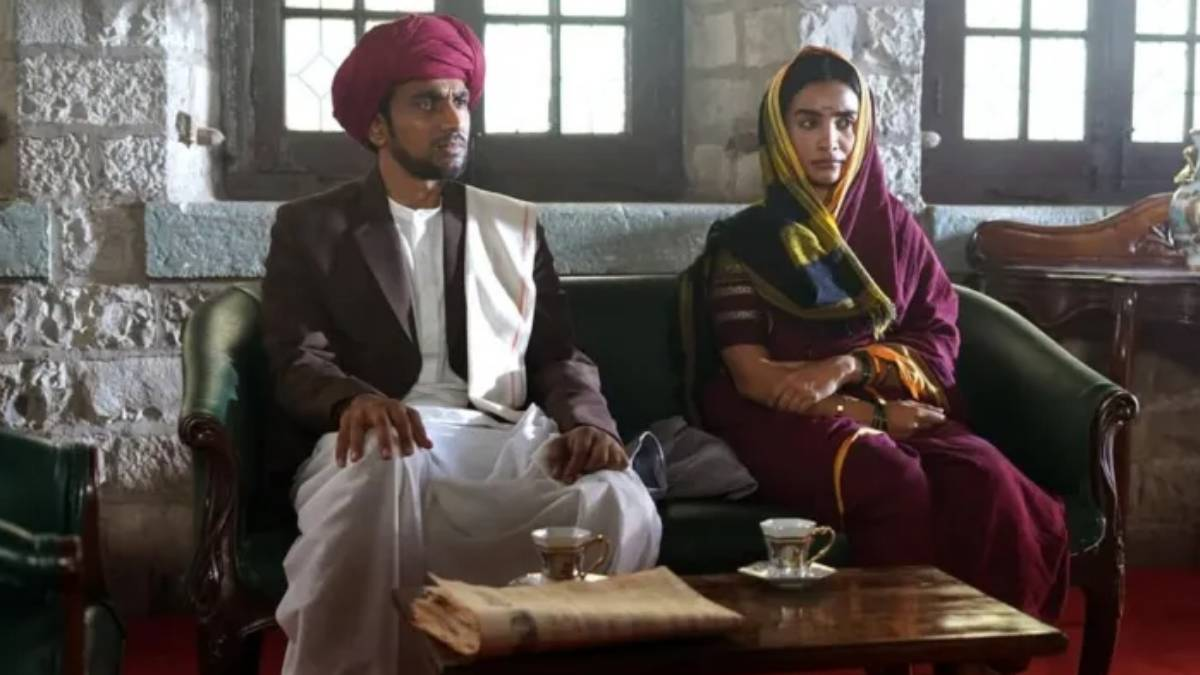The story of the film is successful in showing strong acting and 19th-century India. If there had not been controversy over its authenticity and the scenes cut by the censor board, the film could have been even better. But the cast and crew of Phule should be given credit for bringing back the 19th-century story. Starring Patralekhaa and Pratik Gandhi, who are Indian actors who are capable of doing a lot but are rarely seen, this film has something for everyone. Adorned with emotions, our history, and strong acting, Phule is an important film that must be seen.
Story
Phule begins in 1987, when Pune was battling the bubonic plague, and an old Savitribai, who, without thinking twice, rushes to the camp carrying a child on her back. Later, we see Tare Zameen Par actor Darsheel Safary, while Patralekhaa as Savitri talks about ‘Sethji’ in the past tense, which in a way makes you feel that it could be her husband, who is now probably dead. The film begins on that core memory, and keeping it in mind, the film ends on the same note. In between, we get to see Maharashtrian social reforms, paving the way for Dalits, girls, women, widows, and an adopted son, Jayant.
Like a personal diary, this film of Phule covers many big events related to Savitri and Jyotiba’s lives. As a progressive man of that time, he not only educated his wife but also fought for her rights. The film shows the character of Pratik Gandhi, who was thrown out of his best friend’s wedding, because he was from a lower caste and was given the title of ‘Mahatma’. On the other hand, we see Patralekha as Savitri, a woman who was considered insignificant to her father-in-law due to being childless, and then became the mother of a thousand children.
The woman, who not only stood firmly with her husband in every difficult situation, but also uplifted women, girls, and widows, and depicted the true meaning of feminism. Yes, there are some cuts in the film, as many points are missing in the fight against upper caste oppression, but opening the first girls’ school and becoming the first female teacher of India are covered beautifully. The film can also be an eye-opener for those who always blame the British for the divide and rule policy, but never see the fault in the so-called varna system and gender-biased paradigms. Moreover, the Phule controversy is proof that some things and some mindsets never change.
Writing and directing
Phule’s writing is emotional, but logical context dominates throughout. Written by Mahadevan and Muazzam Beg, the film has many such instances that will stay with you even after you step out of the theatre. Caste and gender inequality are the main storylines of the film, and one is covered thoroughly, while the other is dealt with lightly. Now, is this because of fear due to the current scenario, or due to the decisive planning of the writers, or cuts by the censor board? Such questions can arise in one’s mind.
When it comes to direction, Phule is completely authentic. There are no over-dramatic scenes, no over-themed sets, and no make-up. Moreover, the genuine perfection of the actors is a breath of fresh air. The film moves in a straight line, and the first scene connects the last point beautifully. Also, director Anant Mahadevan should be applauded for not following the Bollywood way of biopic presentations and sticking to reality. There is no exaggerated anger in the actor’s voice, just a call for justice, that too with effort and hard work. Phule can be a classic example of ‘speaking quietly’. Moreover, with just two songs and strong emotional background music, composer Rohan Rohan can make you cry.
Acting
The best part of the film is its actors. Be it Alex O’Neill and Richard Bhakti Klein as the British, Joy Sengupta and Amit Behl as the upper caste priest, or the lead actors Patralekha-Pratik Gandhi, everyone is convincing and on top of their game. Darsheel, on the other hand, disappoints, but that’s also because he has nothing to do; he only has two or three dialogues. Vinay Pathak in the role of Pratik’s father stands out to me.
But if one were to ask for the best, then the chameleon, Pratik Gandhi, the actor who is too choosy to act in multiple projects, is the focal point. Pratik never deviates from the calmness and composure of his character. There are instances where the actor says a lot, that too with his eyes and without any dialogue. The dedication he has put into the role of Mahatma Jyotiba Phule is commendable, and Patralekhaa has supported him as well. The actress is convincing in every scene. She portrays true strength like no one else.
Decision
Phule is a film that definitely speaks of the 19th century but also holds a mirror up to the present times. The film is thought-provoking but at the same time it makes you feel grateful to the ancestors who suffered so much for freedom of all kinds. Packed with emotions, logic and strong acting, this film has everything to offer to those who have the courage to listen. With its heart in the right place, Phule deserves 3.5 stars out of 5.
